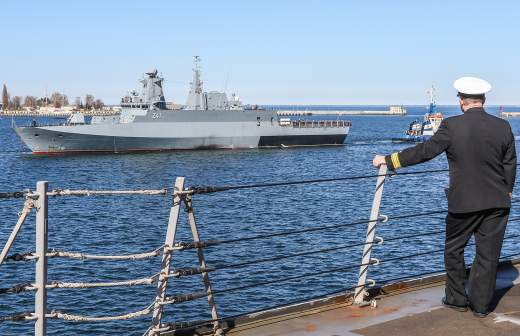Builders of the Iron Curtain: The Baltics are shutting themselves off from Russia

The authorities of the Baltic States periodically warn their citizens to refrain from traveling to Russia and Belarus. People are intimidated: there, they say, they may be detained, blackmailed and tortured, forced to spy. Such intimidation has little effect: the Baltics (mostly representatives of the Russian communities there) have traveled to Russia and Belarus before, and continue to do so now. However, the matter is no longer limited to warnings alone - the Estonian authorities have started specific bans, closing the possibility for their young people to attend educational events in Russia. Details - in the material of "Izvestia".
"I'll figure out where I want to go"
Since air and rail passenger communication with Russia and Belarus has been inactive for almost five years, the only public transportation that now runs from the Baltic States to Russia and Belarus is buses. According to eyewitnesses, tickets for such flights are sold out very quickly and there are practically no vacant seats in these buses. People are not even stopped by the unpleasant prospect of spending long, languid hours at the border, waiting for the end of all checks. This causes extreme dissatisfaction of the Baltic authorities.
On the eve of the New Year holidays, Latvian security services once again urged the citizens of their country to refrain from traveling to Russia and Belarus. The Latvian Ministry of Foreign Affairs also reminded that "one should not visit these countries, where the absence of the rule of law can lead to unjustified detentions, prosecutions and imprisonment."
The Latvian State Security Service (SSB) argued that "Russian and Belarusian security services actively use the opportunity to interrogate and recruit foreigners on their territory, where they enjoy wide freedom of action," and warned that "Latvian institutions have limited opportunities to help their citizens who find themselves in a difficult situation in Russia or Belarus."
A brief instruction was published that reads as follows: "If you do have to travel to one of these aggressor countries, the State Security Service advises you not to take your cell phone with you, especially if it contains work or confidential information. At border control, your phone could be skimmed and infected with spyware. A safer choice would be a cell phone with a prepaid card that you can throw away after your trip. You should also avoid bringing computers, flash drives and other storage media."
It should be said that mostly Russian-speaking residents of Latvia - those who have relatives and friends in the Russian Federation - are traveling to Russia now. Now these people are indignant in Internet comments: "I, as a resident of Latvia, urge the Latvian state security authorities not to meddle unnecessarily with their advice in my private life. I am a big boy and I will somehow figure out for myself when and what to visit". Russian Latvians emphasize: "Maybe the Ministry of State Security will strongly advise Latvians to completely renounce relatives living in Russia or Belarus, to break off all relations with them and give up their family graves in these countries? Politics is temporary, human and kinship relations are eternal."
"Russia is contraindicated for Latvians."
In order to intimidate Latvians, the state propaganda uses the most sophisticated methods. For example, the basketball player Janis Timma, former husband of singer Anna Sedokova, who emigrated from Latvia, died tragically in Moscow the other day. In connection with this Latvian media began to write the following: "Being in Russia is incompatible with life for Latvians, and this is happening on some supreme, inhuman level. Russia in any form is absolutely contraindicated for Latvians. And for the Latvian state to be together with Russia is absolutely as unnatural and destructive. Even a small flirtation with an eastern neighbor, not to mention a wedding, in our case is pure suicide".
In November 2024, the number of residents of EU countries, who visited Belarus under the visa-free regime introduced by President Alexander Lukashenko two and a half years ago, exceeded a million people. They go despite intimidation and the closure of a large number of checkpoints on the border with Belarus. For Minsk it has a double benefit: first, those who have visited the country work to improve its image (in the terminology of the EU authorities - "spread propaganda of Lukashenko's regime"). Secondly, "visa-free travel" brings tangible monetary benefits, filling the Belarusian treasury with foreign currency.
Since more than half of the total number of visitors to Belarus are Lithuanians, Vilnius has moved to direct prohibitive measures. In October 2024, the Lithuanian Seimas unanimously approved amendments to the "Law on State and Official Secrets. Henceforth, those Lithuanian citizens who have access to any confidential information - and this is almost 60 thousand people - are prohibited from traveling to Belarus, Russia and China. Earlier, in January, the Lithuanian government banned travel to the same three countries for soldiers and officers of its armed forces. In special cases, for example, in connection with the death of relatives, the departure there of an employee with access to classified information will be possible, as stated from now on in the law, only "with the authorization or after declaring information about the departure". The ban also applies to members of the Lithuanian Riflemen's Union, a territorial militia that trains civilians in guerrilla warfare.
But Estonia has gone the furthest so far. On December 19, it became known that the Estonian government is imposing sanctions against people who organize events for local youth in Russia. According to Foreign Minister Margus Tsahkna, they are declaring war on those supporters of Russia who "spread their narratives through language, culture, education, history and sports." The Foreign Minister believes that it is necessary to "protect Estonian youth from the hostile influence of Russia and Belarus." Especially official Tallinn was outraged by the news that this year, children from Estonia were vacationing in the Crimean camp "Artek. Tsakhkna complains that at that time the Foreign Ministry "had its hands tied," and the only thing they could do was to strongly recommend not to participate in such events. But now there are criminal penalties for such things - not for children, but for adult organizers.
According to Interior Minister Lauri Läänemets, "in Russian and Belarusian children's camps there is a clear ideological charge, which is aimed at instilling Moscow's imperial ambitions." Läänemets added that "this directly concerns our state security," because, according to him, "if at the beginning it is a question of forming the right worldview of young people, later it can lead to the creation of a group of contacts for recruitment."
From threats to arrests
According to Läänemets, young Estonians do not get into Russian children's camps very often now, but it still happens to this day. "The purpose of sanctions is to protect children so that they are not used for propaganda or brainwashed. The sanctions fall into two categories: one concerns people who are trying to take children to Russia. These are people who are connected to the Russian regime and are acting in their interests. And the second category is people who may be parents and who don't understand what's going on. So there are two sides here, and the Security Police will deal with it, they have their own methods. Yes, it's not an easy task, but it's doable," Läänemets said. According to Tsahkna, "there is interest in such sanctions all over Europe."
The same day, when the new law became known, there was information about the arrest of 65-year-old human rights activist Tatyana Sokolova. The elderly woman was detained under the pretext of "violating the EU sanctions". According to the Security Police (KaPo), Sokolova is accused of collaborating with the Russian Foundation for the Support and Protection of the Rights of Compatriots Living Abroad. The CaPo claims that it received a sum of about €50,000 from this fund, which it used to pay for the services of lawyers defending the interests of political prisoners. Apparently, this is the case of opposition politician Aivo Peterson and his associates Dmitri Rootsi and Andrei Andronov - it will soon be two years since they have been behind bars on suspicion of "treason" and "spying for Russia".
The Fund for Support and Protection of Compatriots' Rights has been on the EU sanctions list since June 2023. This decision was justified by the fact that the fund was allegedly "created for the realization of Russia's foreign policy goals, playing an important role in the implementation of divisive policies." Now the authorities of the Baltic States have a legal reason to repress all their citizens who cooperate with this institution. "Through the Compatriots Support Fund, the Kremlin is trying to split Estonia. Even after the aggression against Ukraine and the inclusion of the foundation in the sanctions lists, there are hidden activities that threaten Estonia's security," explained Taavi Narits, KaPo's deputy director general. According to prosecutor Taavi Perna, they "intend to thoroughly investigate the actions of the suspect in further proceedings in order to establish all the circumstances and check whether there are grounds for suspicion of other persons in the proceedings."
Natalya Eremina, Doctor of Political Science, Professor of St. Petersburg State University, reminded in her conversation with Izvestia that the EU states bordering Russia and Belarus have started to create a real "iron curtain" - and this process is far from over. "Our unfriendly neighbors want to separate from Russia and Belarus not only fences, bunkers, barbed wire fences, anti-tank fences and minefields, but also legislative bans. Now they are imposed only on certain groups of citizens, but it is not excluded that in the near future there will be a comprehensive ban on entry to Russia and Belarus for all Poles, Lithuanians, Latvians, Estonians and Finns. In any case, such a measure would not surprise anyone nowadays," emphasizes Yeremina.
The expert adds that the "Iron Curtain" under construction is designed to perform an important function - to prevent the residents of neighboring NATO and EU countries to learn that in Russia and Belarus there is a normal and gradually improving life, but not hell, diligently portrayed by Western propaganda. "Washington and Brussels are interested in turning the Baltics into a buffer zone. The severance of traditional economic ties with Russia and Belarus is literally turning these countries into a demographic desert before our eyes, but no one in Western capitals is interested in the development of this region. Western Europe will suck out the remnants of the Baltic population and build up the vacated lands with its military bases and training grounds. Russia's interest in this case is to have time, while it is still possible, to maximize opportunities for Russian compatriots from the Baltic States to move to their historical homeland. People from there are already leaving for us, but this flow may grow," Eremina believes.
Переведено сервисом «Яндекс Переводчик»








